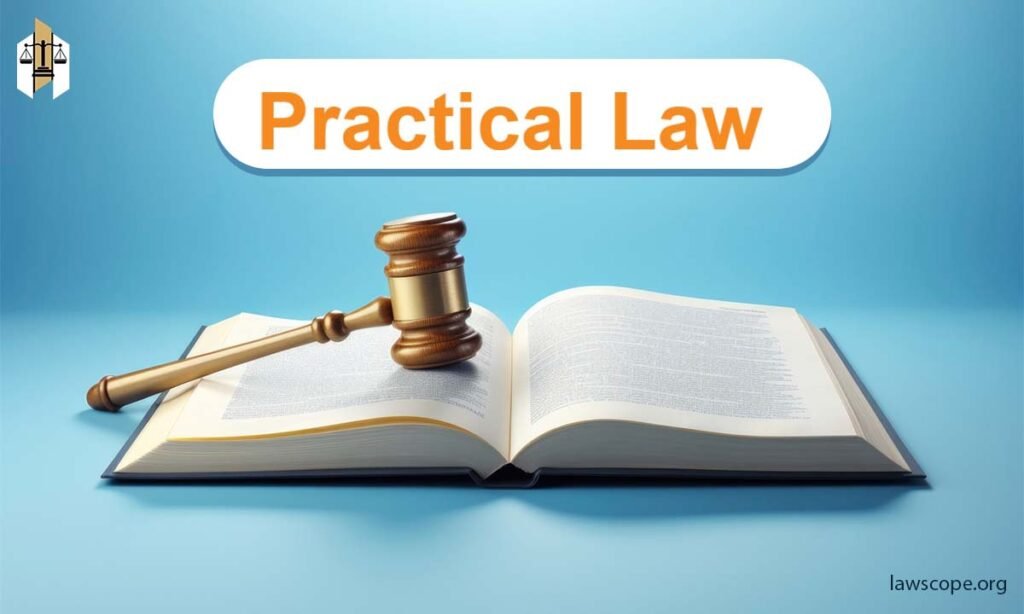
In the intricate world of legal complexities, the term “Practical Law” shines as a guiding light, offering individuals and businesses a compass to navigate through the legal labyrinth with expert guidance.
This blog explores the significance of Practical Law Insights, delving into its role in steering clear of the unlawful practice of law.
We’ll also unravel the offerings of the Practicing Law Institute (PLI) and ponder the intriguing Can you practice law without a law degree?
Understanding The Essence of Practical Law
In the vast expanse of legal intricacies, this dedication is extended to the beacon of clarity and empowerment – Practical Law.
To those who navigate the legal landscape, Practical Law stands as a guiding star, illuminating the path with its practical wisdom and actionable insights.
It is not just a legal term; it’s a paradigm shift in how we approach legal knowledge.
Unlike the dusty tomes of legal theory, Practical Law focuses on the real-world application of legal principles, making it accessible to a broad audience.
It acts as a bridge between complex legal concepts and everyday challenges, providing actionable insights that empower individuals and businesses.
The beauty of Practical Law lies in its simplicity.
It breaks down the intricacies of legal jargon, making legal knowledge comprehensible for those without a formal legal background.
It is about applying legal principles practically, enabling users to make informed decisions in their personal and professional lives.
To the seekers of legal understanding, this dedication embraces Practical Law as a steadfast companion on the journey through complexities.
With its ability to distill intricate legal concepts into understandable, applicable knowledge, It become a trusted ally for individuals and businesses alike.
Recognition of Practice Law’s Role
In recognition of Practical Law’s role in demystifying the legal realm, this dedication extends gratitude to the minds behind this transformative approach.
To the legal professionals, educators, and innovators who contribute to the creation and dissemination of Practical Law’s Insights, your dedication to making legal knowledge accessible is commendable.
For every individual who has ever faced a legal challenge, this dedication honors Practical Law’s as the bridge between the theoretical and the practical.
It acknowledges the role it plays in empowering non-lawyers to confidently address legal issues, transforming the daunting into the manageable.
In tribute to the Practicing Law Institute (PLI), whose commitment to practical legal education is exemplified through Practical Law’s, this dedication recognizes the institute’s dedication to fostering a community of informed, empowered professionals.
Through PLI’s efforts, Practical Law becomes more than a resource; it becomes a vehicle for continuous learning and skill development.
May this dedication serve as a testament to the transformative power of Practical Law, a tool that empowers, enlightens, and elevates those who embark on the journey of legal understanding.
In the pursuit of clarity, confidence, and competence, It stands as a dedicated guide, making the legal landscape navigable for all.
Navigating The Boundaries: Unlawful Practice of Law
While It empowers individuals with valuable legal insights, it’s imperative to understand the boundaries and avoid the unlawful practice of law.
The unauthorized practice of law occurs when individuals provide legal advice or services without the necessary qualifications, threatening the integrity of the legal system.
Practical Law Insights, when used responsibly, become a tool to identify the fine line between general legal knowledge and specific legal advice.
It serves as a safeguard, guiding users away from unwittingly engaging in activities that could lead to unlawful practices.
Practicing Law Institute (PLI): A Citadel of Legal Expertise
Amidst the myriad of legal resources, the Practicing Law Institute (PLI) stands tall as a beacon of legal expertise.
As a pioneer in legal education, PLI caters to professionals at various stages of their careers.
From attorneys and business professionals to recent law graduates, PLI provides a platform for continuous learning and skill development.
PLI’s commitment to practical legal education ensures that participants gain insights directly applicable to their daily professional lives.
The institute covers a diverse range of legal topics, equipping individuals with the knowledge they need to navigate complex legal landscapes confidently.
Can You Practice Law Without a Law Degree?
The question of whether one can practice law without a law degree is a fascinating conundrum.
While the traditional path involves obtaining a law degree and passing the bar exam, there are instances where individuals may engage in legal activities without holding a formal law degree.
In many jurisdictions, the unauthorized practice of law is strictly prohibited, emphasizing the importance of formal legal education and licensure.
However, there are exceptions where non-lawyers are permitted to provide legal services in specific contexts, such as administrative hearings or small claims court.
It emerges as a valuable tool for non-lawyers navigating legal issues.
Although not a substitute for formal legal education, it empowers individuals with practical insights.
For example, a small business owner, armed with Practical Law’s knowledge, can draft contracts and ensure compliance with relevant laws, mitigating legal risks.
Embracing Practical Law’s For Everyday Challenges
It serves as a versatile and valuable resource for individuals facing everyday legal challenges.
Whether it’s understanding a lease agreement, drafting contracts, or navigating employment law issues, Practical Law provides insights that empower users to make informed decisions.
The essence of Practical Law lies in its ability to make legal knowledge accessible and applicable.
It acts as a guide, breaking down legal complexities into manageable pieces.
It empowers users to proactively address legal challenges without the need for formal legal education, bridging the gap between the legal realm and the everyday world.
Discover More: C.W. Park USC Lawsuit: Unveiling The Legal Battle and Its Impact
Top 5 Frequently Googled Questions About Practical Law
Practical Law Insights has become a valuable resource for individuals and businesses seeking to navigate legal challenges with expert guidance.
As people explore this dynamic field, they often turn to search engines with questions to enhance their understanding.
Here are the top five frequently Googled questions on Practical Law Insights, along with concise and informative answers.
1. What is Practical Law, and How Does It Differ From Traditional Legal Knowledge?
Practical Law is a legal resource that focuses on the practical application of legal principles rather than theoretical concepts.
It provides actionable insights and guidance, making it more accessible than traditional legal knowledge.
Unlike abstract theories, Practical Law empowers individuals and businesses to navigate real-world legal challenges with confidence.
2. Can Practical Law Help Non-Lawyers Understand and Address Legal Issues?
Absolutely. Practical Law is designed to be understood by a diverse audience, including non-lawyers.
It breaks down complex legal concepts into easily digestible information, offering valuable insights that empower individuals to address legal issues effectively.
With resources like this, non-lawyers can gain a deeper understanding of the laws that impact their lives and businesses.
3. How Can Practical Law Prevent The Unlawful Practice of Law?
Practical Law’s serves as a guide, helping individuals differentiate between legal guidance and the unlawful practice of law.
By offering insights into the practical application of legal principles, it helps users understand the boundaries of legal knowledge.
Responsible use of Practical Law’s can steer individuals away from engaging in activities that could unintentionally cross into the realm of unlawful practice.
4. What Does The Practicing Law Institute (PLI) offer in Terms of Practical Law Education?
The Practicing Law’s Institute is a leading institution providing practical legal education.
PLI offers a wide array of programs covering diverse legal topics, including corporate law, intellectual property, and litigation.
Participants gain actionable insights directly applicable to their professional lives, ensuring they are well-equipped to navigate complex legal landscapes with expert guidance.
5. Can You Practice Law Without a Law Degree, and How Does Practical Law Play a Role in This?
While the traditional path to becoming a lawyer involves a law degree and passing the bar exam, Practical Law is a valuable tool for non-lawyers.
It provides practical insights that empower individuals to address legal challenges responsibly.
While specific legal activities may require formal legal education and a license, Practical Law serves as a bridge, enabling non-lawyers to engage with legal principles effectively.
May You Like Also: Workplace Injury Lawyer: Your Advocate For Compensation and Justice
Conclusion
In conclusion, Practical Law Insights offers a transformative approach to legal understanding, making it accessible to all.
Navigating legal challenges becomes less daunting with the aid of Practical Law, providing a bridge between theoretical legal concepts and real-world applications.
As we explore the dynamic landscape of legal resources, let Practical Law be your guiding companion in mastering the legal maze.
You May Like Also:



One thought on “Practical Law Insights: Navigating Legal Challenges With Expert Guidance”